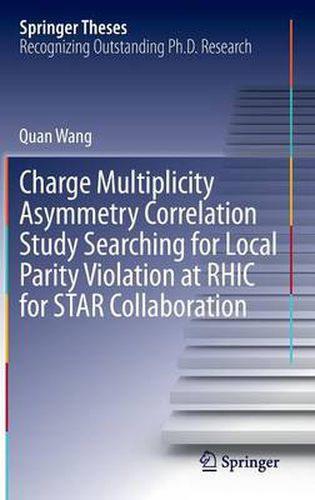Readings Newsletter
Become a Readings Member to make your shopping experience even easier.
Sign in or sign up for free!
You’re not far away from qualifying for FREE standard shipping within Australia
You’ve qualified for FREE standard shipping within Australia
The cart is loading…






This title is printed to order. This book may have been self-published. If so, we cannot guarantee the quality of the content. In the main most books will have gone through the editing process however some may not. We therefore suggest that you be aware of this before ordering this book. If in doubt check either the author or publisher’s details as we are unable to accept any returns unless they are faulty. Please contact us if you have any questions.
It has been suggested that local parity violation (LPV) in Quantum Chromodynamics (QCD) would lead to charge separation of quarks by the Chiral Magnetic Effect (CME) in heavy ion collisions. Charge Multiplicity Asymmetry Correlation Study Searching for Local Parity Violation at RHIC for STAR Collaboration presents the detailed study of charge separation with respect to the event plane.
Results on charge multiplicity asymmetry in Au+Au and d+Au collisions at 200 GeV by the STAR experiment are reported. It was found that the correlation results could not be explained by CME alone. Additionally, the charge separation signal as a function of the measured azimuthal angle range as well as the event-by-event anisotropy parameter are studied. These results indicate that the charge separation effect appears to be in-plane rather than out-of-plane. It is discovered that the charge separation effect is proportional to the event-by-event azimuthal anisotropy and consistent with zero in events with zero azimuthal anisotropy.
These studies suggest that the charge separation effect, within the statistical error, may be a net effect of event anisotropy and correlated particle production. A potential upper limit on the CME is also presented through this data.
$9.00 standard shipping within Australia
FREE standard shipping within Australia for orders over $100.00
Express & International shipping calculated at checkout
This title is printed to order. This book may have been self-published. If so, we cannot guarantee the quality of the content. In the main most books will have gone through the editing process however some may not. We therefore suggest that you be aware of this before ordering this book. If in doubt check either the author or publisher’s details as we are unable to accept any returns unless they are faulty. Please contact us if you have any questions.
It has been suggested that local parity violation (LPV) in Quantum Chromodynamics (QCD) would lead to charge separation of quarks by the Chiral Magnetic Effect (CME) in heavy ion collisions. Charge Multiplicity Asymmetry Correlation Study Searching for Local Parity Violation at RHIC for STAR Collaboration presents the detailed study of charge separation with respect to the event plane.
Results on charge multiplicity asymmetry in Au+Au and d+Au collisions at 200 GeV by the STAR experiment are reported. It was found that the correlation results could not be explained by CME alone. Additionally, the charge separation signal as a function of the measured azimuthal angle range as well as the event-by-event anisotropy parameter are studied. These results indicate that the charge separation effect appears to be in-plane rather than out-of-plane. It is discovered that the charge separation effect is proportional to the event-by-event azimuthal anisotropy and consistent with zero in events with zero azimuthal anisotropy.
These studies suggest that the charge separation effect, within the statistical error, may be a net effect of event anisotropy and correlated particle production. A potential upper limit on the CME is also presented through this data.